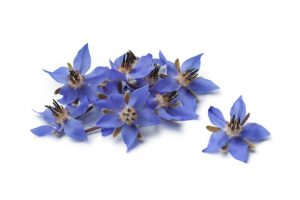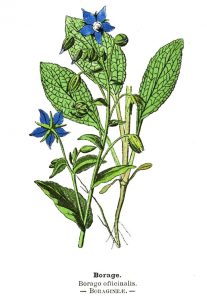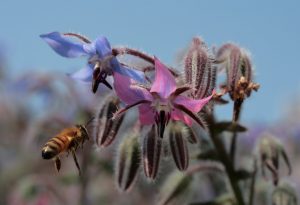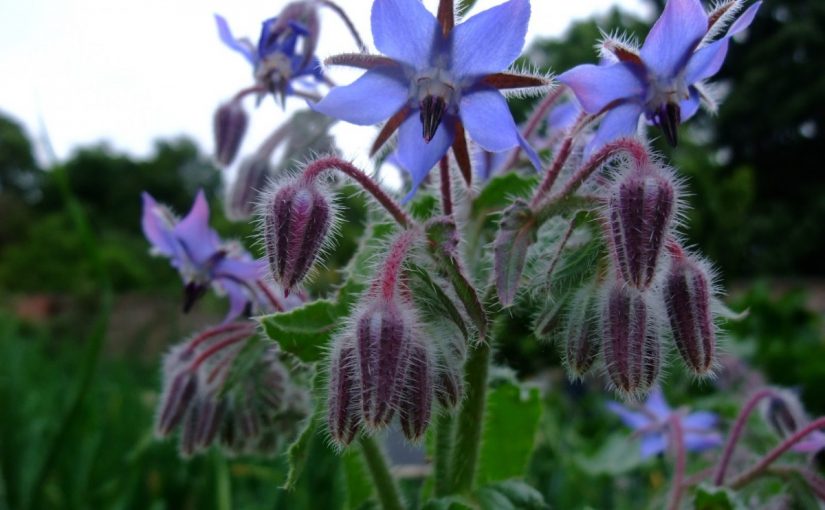Borago Officinales Member of the Borageinaccae family
Member of the Borageinaccae family
Known as the herb of gladness and burrage
Commonly referred to as Borage or Starflower, this herb has a well established reputation. In almost all historical writings surrounding borage, its power to uplift spirits and dispel gloom never go unnoticed. There is an ancient Latin verse that translates as “I, Borage, bring always gladness” and 17th century English botanist and herbalist John Garard believed ‘the leaves and flowers of borage put in wine make men and women glad and merry and drive away all sadness, dullness, and melancholy.’ Modern herbablists praise borages influence on hormonal activity. Cortisol, the stress hormone, and aldesterone are both supported by the essential fatty acids in the herb. Borage restores vitality in the body and bones and calms the mind. Romans would feed borage to gladiators before their games and crusaders drank borage tea before battles.
In Italy borage is served as a side dish. In the U.S., it is typically found as an herbal supplement in powdered or tincture form. The leaves and bright blue-purple star shaped flowers have a taste similar to cucumbers, making a pleasant addition to salads, soups, cheeses, and beverages and when these plant parts are dried, they make a nutritive tea.
Health benefits of the Borage plant:
- Essential fatty acids such as Gamma linolenic acid (GLA). Essential fatty acid d
 eficiencies can affect mood, internal inflammation, and various cellular functionsHigh levels of calcium and iron
eficiencies can affect mood, internal inflammation, and various cellular functionsHigh levels of calcium and iron - Potassium
- Zinc
- A, B, and C vitamins
- Restores adrenal glands to their natural balance, creating a calmer mind and body
- Natural sedative
- Anti-inflammatory properties for skin and internal complications (current research is being done on Borage and arthritis)
Dosage
Borage can be taken fresh, in capsule form, or as a liquid extract.
A typical dose of the capsule  form is one to two grams per day. More than that can be tiring to the liver. Dried borage leaves and petals can be brewed into a tea. Three or four flowers mixed with leaves will be enough for 8 ounces of hot water.
form is one to two grams per day. More than that can be tiring to the liver. Dried borage leaves and petals can be brewed into a tea. Three or four flowers mixed with leaves will be enough for 8 ounces of hot water.
Borage grows well in Pacific NorthWest summers and has the potential to be a cost-effective mood enhancer. The bees like them, too.
Images:
http://www.gourmetfoodreview.com/recipegourmet/cooking-herbs/
harvesttotable.com
http://www.macrolensmastery.com/tag/borage/

I’ve read several excellent stuff here. Certainly
price bookmarking for revisiting. I wonder how so much attempt you put to make one of these wonderful informative website.
Thank you. It took about 5 hours of research and an hour to write it up and put the images with the words.
I appreciate the historical context and examples; I take a homeopathic cortisol manager, and I wonder if any of it is a borage compound. I like the rhymes and the feeling of whimsy and honest joy associated with the plant, a feeling of goodness not escapism or excess. Borage — I’ll keep it in mind as a plant-friend.
Thank you so much for your feedback. I’m happy that my corny-ness was enjoyable.